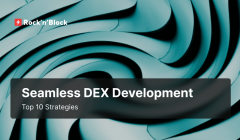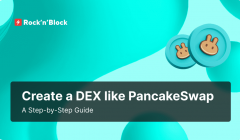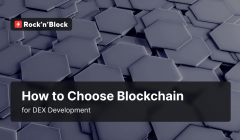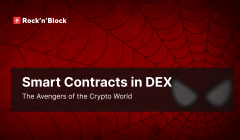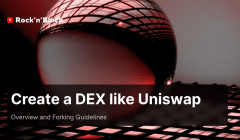Open Source Code's Role in DEX Development
03 May 2024In the world of DeFi, decentralized exchanges (DEXs) are changing the way we trade digital assets. At the heart of this change is the idea of open source development, where the code that powers these exchanges is open for anyone to see and contribute to. This article explores how this collaborative and open approach assists decentralized exchanges development. From transparency and security to fostering global collaboration and innovation, we unravel the multifaceted contributions of open source principles in shaping the landscape of decentralized exchanges and redefining the future of digital asset trading.
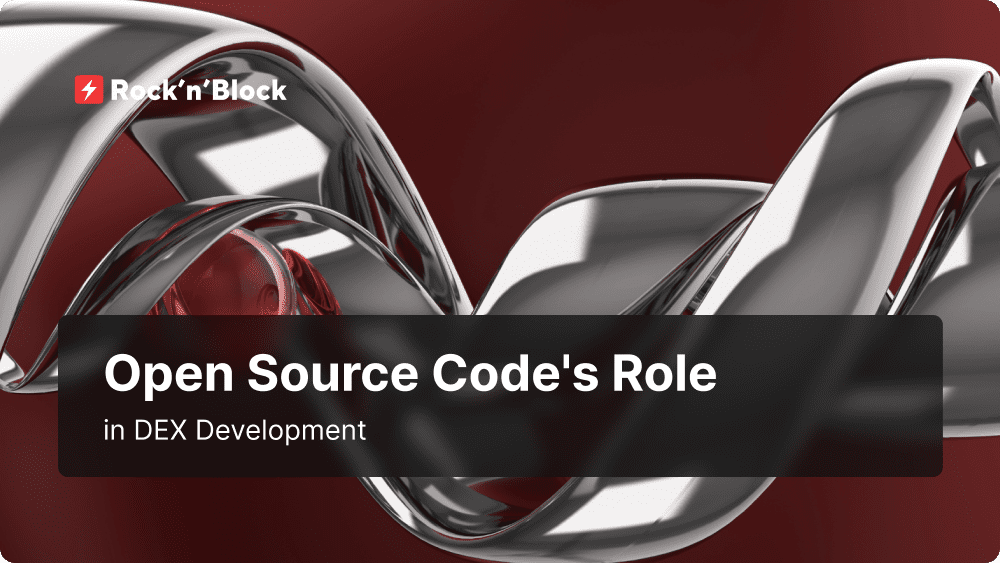
Table of Contents:
-
Open Source Approach in DEX Development
-
Primarily Roles of Open Source Code in DEX Development
-
1. Transparency and Trust
-
2. Cost and Time-Efficiency for DEX Development
-
3. Community Collaboration
-
4. Security Best Practices
-
5. Innovation and Customization
-
6. Knowledge Sharing
-
7. Compatibility with Standards
-
8. Community Governance
-
9. Continuous Improvement
-
Conclusion
Open Source Approach in DEX Development
In the landscape of decentralized finance and DeFi exchange development, the essence of open-source code emerges as a transformative force in DEX development. At the heart of this paradigm shift lies a set of principles that redefine how DEXs are conceptualized, built, and maintained. Open source code in DEX development includes transparency, collaboration, and adaptability, creating an era where the global community becomes an integral part of the innovation process.
This core principle not only guarantees the reliability of DEX platforms but also inspires a dynamic pool of ideas, allowing developers around the world to work together to shape the future of decentralized finance.
Check out our full guide on The Essentials of DeFi Exchange Development!
Primarily Roles of Open Source Code in DEX Development
The role of open source code in decentralized exchange development is pivotal, bringing several key benefits to the ecosystem. The primary roles and advantages of open source code in DEX development are listed below.
1. Transparency and Trust
Transparency and trust are foundational elements facilitated by open source code in the decentralized exchange development. The entire codebase's availability for public access enables users, developers and security experts to comprehensively review every aspect of the DEX's underlying architecture. This enables interested users to examine, evaluate and validate the integrity of the code, ensuring that there are no hidden features or vulnerabilities in the code.
This transparent approach not only instills confidence in end-users, who can verify that the platform operates as advertised, but also fosters a sense of accountability within the development community. Users can have a clear understanding of how their data is handled, trades are executed, and security measures are implemented. This transparency not only establishes a foundation of trust but also encourages collaborative efforts to enhance the DEX's efficiency and security, creating a symbiotic relationship between DEX developers and users based on openness, accountability, and mutual assurance.
2. Cost and Time-Efficiency for DEX Development
Open source code significantly streamlines the initiation of decentralized exchange development for developers, saving time and resources. By providing a readily available codebase, open source DEXs can share their codebase which can be used for new DEX platforms development. Developers can focus on customizing the user interface, implementing unique features, and ensuring regulatory compliance without spending extensive time on foundational elements. Essentially, open source code serves as a cost and time-efficient gateway, allowing developers to get started quickly on DEX development with a robust framework at hand.
3. Community Collaboration
The open source nature of DeFi projects development encourages a collaborative approach. Developers from diverse backgrounds and expertise levels can contribute to the project by submitting code improvements, identifying and fixing bugs, or suggesting new features. This collaborative effort draws the collective knowledge and skills of a global community.
4. Security Best Practices
Open source code enables continual peer review of the code, improving security. Developers from around the globe can examine the code for vulnerabilities and suggest improvements, resulting in more robust and secure DEX platforms development.
Numerous open source DEX projects follow security best practices. Initiation of the development process with a codebase that has undergone community review allows DEX developers to build on a foundation that prioritizes security, reducing the risk of vulnerabilities and improving the overall robustness of their DEX.
5. Innovation and Customization
The openness of the codebase allows developers to explore, experiment, and implement innovative features that can set their projects apart in the competitive DEX development landscape. The collaborative nature of open source projects invites a diverse range of contributions, fostering a culture of constant improvement, innovation and creativity within the development community.
6. Knowledge Sharing
Open source code in decentralized exchange development facilitates a rich ecosystem of knowledge sharing among developers. The transparent nature of open source projects encourages developers to document their work comprehensively, creating a valuable repository of insights, best practices, and coding conventions. Developers can delve into the documentation to gain a deep understanding of the DEX's architecture, APIs, and intricate details of its implementation.
Furthermore, collaborative forums, discussion boards, and community-driven platforms associated with open source DEX projects provide a space for developers to share their experiences, ask questions, and exchange ideas. This vibrant knowledge-sharing environment not only accelerates the learning curve for newcomers but also enables seasoned developers to stay informed about the latest advancements in decentralized finance and blockchain technology.
7. Compatibility with Standards
Open source code in the context of DEX development offers a distinct advantage in terms of compatibility with industry standards and protocols. DEXs operate in a dynamic and evolving landscape of blockchain technology and decentralized finance, where compliance with standards is critical for interoperability and widespread adoption.
Open source projects often prioritize compatibility with established blockchain standards, ensuring the seamless DEX development with widely accepted protocols. This compatibility extends beyond basic blockchain functionality and includes compliance with emerging token standards, consensus mechanisms, and smart contract development standards.
By aligning with these industry norms, developers can ensure that their DEXs are not only technically robust but also well-positioned to interact with a diverse array of blockchain ecosystems. This alignment leads to smoother interactions with other decentralized applications, wallets, and blockchain networks, contributing to a more collaborative and integrated blockchain ecosystem.
8. Community Governance
Decentralized decision-making in open-source DeFi exchange development is a cornerstone of community governance. Many projects within the decentralized exchange space have adopted innovative models that actively involve token holders and engaged contributors in shaping the platform's future. This decentralized decision-making framework typically allows individuals with a stake in the project, often represented by ownership of project tokens, to propose and vote on project related matters.
These matters can range from protocol upgrades and adjustments to security measures and the introduction of new features. By distributing decision-making power across the community, open-source DEXs reduce the influence of any single entity and foster a more democratic, inclusive approach to governance.
This not only enhances the resilience and adaptability of the DEX but also aligns with the core principles of decentralization, ensuring that the community has a direct say in the evolution of the platform. The result is a dynamic ecosystem where the collective wisdom and interests of the community guide the development direction, promoting a more robust and responsive decentralized exchange.
9. Continuous Improvement
Continuous improvement is a key feature of open source DEX development, fostering a dynamic and responsive ecosystem. The cooperative quality of open-source welcomes input and contributions from a varied community of users and developers. This ongoing feedback loop becomes a catalyst for continuous iteration and improvement of the DEX platform.
Developers can promptly address reported issues, implement suggested improvements, and integrate new features based on real-world usage and community needs. The iterative development cycle ensures that DEX platforms evolve alongside the rapidly changing landscape of decentralized finance and blockchain technology.
In summary, open source code in DEX development cultivates a collaborative and transparent environment, leading to more secure, innovative, and adaptable decentralized exchange software development. It aligns with the core principles of decentralization, empowering a global community to contribute to the evolution of the blockchain and cryptocurrency ecosystem.
Open-Source Decentralized Exchanges Examples
Let's explore pioneering examples that continue to shape the decentralized exchange space.
1. Uniswap
Uniswap, an Ethereum-based DEX, is one of the leaders in the space. Its open source nature enables users and developers to review the code, fostering transparency and trust. Various community-driven iterations and forks continue to enhance and customize the Uniswap experience.
Check out our comprehensive article about how to Create a DEX like Uniswap: Overview and Forking Guidelines!
2. PancakeSwap
PancakeSwap, built on the Binance Smart Chain, is a testament to the cross-chain adaptability of open source DEXs. Its codebase, derived from Uniswap, showcases the flexibility and collaborative nature of decentralized development.
Read our guide that will navigate you through the essential components and procedures required to Create a DEX like PancakeSwap: A Step-by-Step Guide!
3. SushiSwap
Born as a fork of Uniswap, SushiSwap has grown into a vibrant ecosystem, introducing novel features and governance mechanisms. Its open source codebase empowers the community to contribute, ensuring a continuous cycle of improvements and adaptations.
To learn more about DEXs and their development process, please refer to our complete guide: Full Guide on Decentralized Exchange Development in 2024, covering everything from basic blockchain technologies to the nuances of smart contract implementation, user interface design, security considerations, and beyond.
Conclusion
The role of open source code in the decentralized exchange development is diverse, as it plays a crucial part in shaping their ethos, ensuring security, fostering innovation and promoting transparency. This empowers a global community of developers and users to work together and improve the integrity and safety of DEX platforms. Open source development aligns with the principles of decentralization and trust, and contributes to the growth and evolution of the broader blockchain ecosystem.
We ❤️ Development
Follow us on social media to receive the hottest blockchain development updates
Crunchbase ⚡️Twitter ⚡️Telegram⚡️LinkedIn⚡️Facebook⚡️Instagram⚡️Quora
